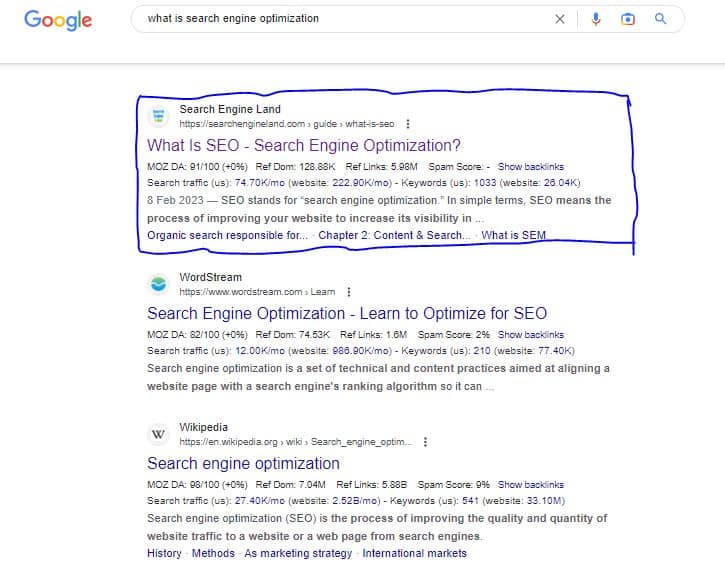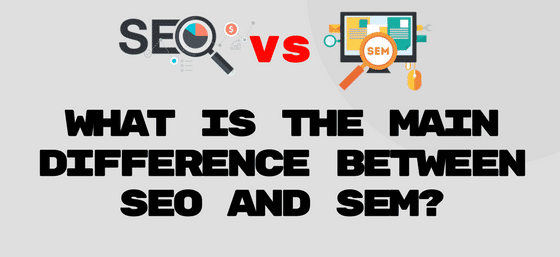WHY SEARCH ENGINE OPTIMIZATION IS CRUCIAL FOR YOUR ONLINE SUCCESS IN 2023
In the digital age, having an online presence is crucial for any business or individual looking to establish their brand or reach a wider audience. However, simply having a website does not automatically guarantee success. To truly succeed online, businesses must invest in search engine optimization (SEO). In this article, we will discuss why SEO is crucial for online success, how it works, and steps you can take to implement it on your website.
What is search engine optimization (SEO)
SEO is the process of optimizing your website to rank higher on search engine results pages (SERPs). This involves a variety of techniques designed to improve the quality and relevance of your website’s content, structure, and design.
SEO is critical for achieving online success because it helps businesses get discovered online. Without a strong online presence, businesses will struggle to attract and retain customers in today’s digital world.

How search engines work
Search engines, such as Google, use complex algorithms to analyze and rank websites based on various factors. While the exact formula is constantly changing, some general factors that impact ranking include:
-
Keywords: Search engines analyze the content of web pages to understand what they are about and match user queries with relevant results.
-
Links: Search engines see links as votes of confidence in the content on a website. They take into account the quality and quantity of inbound links to a website when ranking it.
-
Content quality: The relevance, depth, and quality of the content on a website is also an important factor in determining ranking.
-
User experience: Search engines aim to provide the best possible user experience for their users. Web pages that are easy to navigate, mobile responsive, and with faster loading speed tend to perform better from a search engine perspective.
-
Social signals: Social media presence and activity are also factors taken into account by search engines to determine a website’s ranking.
Crawling and Indexing of Website
Crawling and indexing are two important processes of search engine optimization (SEO). Crawling is the process where search engine bots or crawlers scan through the pages of a website and try to understand its content, structure, and links. Crawlers look for information on the website, such as text, images, videos, and links. They then send this information back to the search engine’s server.

Indexing is the next step where the search engine stores the information gathered during the crawling process. The search engine creates an index of all the content on the website, and this index is used to retrieve relevant results for queries made by users.
When a user types a query into a search engine, it retrieves relevant results from its index and displays them on the search engine results pages (SERPs).
To ensure that a website is being crawled and indexed properly, it is important to have a well-structured website with relevant content, sitemaps, and proper interlinking. Additionally, it is important to avoid duplicate content, broken links, or other technical issues that may prevent crawlers from accessing and indexing the website’s pages.
Google Search Console As an SEO tool
Google Search Console is a free tool provided by Google that allows website owners to monitor and optimize their site’s performance in Google search results. By submitting a sitemap, website owners can track their site’s search traffic and performance, identify and fix issues with their site’s visibility in search results, and learn about the searches that are bringing traffic to their site.
Google Search Console also provides insights into how Google crawls and indexes a website, and offers suggestions for improving the site’s search engine optimization (SEO) strategies.
Website owners should connect their websites with Google Search Console to monitor and improve their search engine optimization.
Benefits of SEO for Your Online Success
SEO is a long-term investment that can provide significant benefits for your online success. By implementing effective SEO strategies, you can improve your website’s visibility, attract more traffic, and ultimately drive more sales and revenue.
- Increased organic traffic: SEO can drive more organic traffic to your website, resulting in more leads, sales, and revenue. This can lead to increased visibility and traffic. The higher your website ranks, the more likely users are to click through to your website.
- Increase conversion rates: When your website ranks higher in Search Engine Result Pages (SERPs), it’s more likely to attract high-quality leads interested in your products or services. That is, SEO can increase the likelihood of visitors taking specific actions on your site, such as filling out a contact form or making a purchase.
- Boost brand credibility and authority: SEO can give your brand more credibility and authority in your industry, which can help attract and retain customers. Websites that rank high in search results are perceived as more trustworthy and credible.
- Enhanced website user experience: SEO can help you create a more user-friendly and engaging website experience that keeps visitors on your site for longer.
- Competitive advantage: SEO can give your business a competitive advantage over others in your industry by helping you rank higher on SERPs and stand out from the competition.
SEO Statistics
Here are some of the latest search engine optimization statistics:
- 68% of online experiences begin with a search engine. (BrightEdge)
- 53% of website traffic comes from organic search. (BrightEdge)
- 93% of online experiences begin with a search engine. (Search Engine Journal)
- 89% of marketers consider SEO to be successful. (Databox)
- The top three search engine results receive 75% of clicks. (HubSpot)
- 72% of marketers believe that the relevance of content is the most important factor in driving SEO. (HubSpot)
- Voice search is expected to make up 50% of all online searches by 2021. (Campaign)
- 61% of marketers say improving SEO and growing their organic presence is their top inbound marketing priority. (HubSpot)
- 40% of website owners say increasing organic traffic is their top SEO goal. (Databox)
- Businesses that blog receive 97% more backlinks to their website than those that don’t. (HubSpot)
Source: Search Engine Journal, Hubspot, BrightEdge
These statistics highlight the importance of SEO in driving website traffic, increasing visibility, and achieving marketing success.
ALSO READ: Key things to consider when finding the best digital marketing agency in Lagos Nigeria
Steps to Implement SEO on Your Website
To implement SEO on your website, you should take the following steps:
- Perform keyword research: Keyword research involves identifying the specific keywords and phrases that potential customers are using to search for products or services related to your business. In performing keyword research, your keywords must cut across; transactional, informational, commercial, and navigational keywords.
- On-page optimization: Sometimes called On The Page Seo. On-page optimization involves optimizing the content, structure, and design of your website to make it more appealing and relevant to users and search engines.
- Off-page optimization: Off-the-page SEO or Off-page optimization involves building high-quality backlinks to your website from other reputable sites, which can improve its authority and ranking on SERPs.
- Technical optimization: Technical optimization involves optimizing your website’s code and structure to improve its speed, reliability, and usability.
- Content creation: Content creation involves creating high-quality, informative, and engaging content that is optimized for both users and search engines.
- Local SEO: Local SEO refers to the optimization of a website or online presence for local search results. This helps businesses connect with potential customers near their physical location. Local SEO strategies include optimizing Google My Business listings, building local citations, creating localized content, and earning customer reviews.
ALSO READ: Boost your business revenue using digital sales strategies
Common SEO Mistakes to Avoid
To get the most out of your SEO strategy, it’s important to avoid common mistakes that can negatively impact your website’s ranking on search engines. Here are some SEO mistakes to avoid:
- Keyword stuffing: Keyword stuffing involves using keywords excessively in your content or metadata, which can lead to penalties from search engines and a poor user experience.
- Duplicate content: Duplicate content involves copying or duplicating content from other websites, which can hurt your website’s authority and ranking on SERPs.
- Poor-quality backlinks: Poor-quality backlinks are links from low-quality or spammy websites that can hurt your website’s authority and ranking on SERPs.
- Ignoring mobile optimization: Ignoring mobile optimization can result in a poor user experience for mobile users and hurt your website’s ranking on SERPs.
- Overlooking analytics and metrics: Overlooking analytics and metrics can make it difficult to measure the success of your SEO efforts and make data-driven decisions to improve them.
By avoiding these common SEO mistakes, you can help ensure that your website is optimized for search engines and has the best chance of ranking well, attracting organic traffic, and achieving marketing success
Conclusion
SEO is a critical component of any successful digital marketing strategy, helping businesses get discovered online, attract and retain customers, and stay competitive in their industry.
Businesses should invest in SEO by developing and implementing effective strategies that focus on quality, relevance, and usability.
SEO will continue to be an important aspect of digital marketing in the future as search engines become more sophisticated and users demand more personalized and engaging online experiences.
For more insights on how to improve your website’s ranking, get in touch with Dulph Digital. Our team of experts can help you devise a custom SEO strategy tailored to your business goals and needs.
We look forward to hearing from you!
-The Dulph Digital Team.







